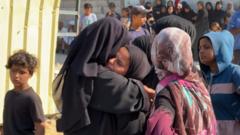Israeli organizations B'Tselem and Physicians for Human Rights-Israel have released reports accusing the government of pursuing systematic measures that lead to the destruction of Palestinian society in Gaza. The Israeli government refutes these claims as unfounded and blames Hamas for the ongoing violence.
Israeli Rights Groups Claim Genocide in Gaza Amid Ongoing Conflict

Israeli Rights Groups Claim Genocide in Gaza Amid Ongoing Conflict
Two prominent Israeli human rights organizations allege that Israel's actions in Gaza constitute genocide against Palestinians, prompting international criticism and debate.
Israel's ongoing conflict with Hamas has escalated tensions, with allegations of war crimes and genocide becoming a focal point in international discourse. Recent reports from B'Tselem and Physicians for Human Rights-Israel present troubling evidence of targeted attacks on civilians and healthcare infrastructure, asserting that these actions fulfill the legal criteria for genocide as outlined in international law.
In a news conference in Jerusalem on Monday, B'Tselem and Physicians for Human Rights-Israel summarized their findings in separate yet complementary reports stemming from the past 21 months of conflict. These findings have ignited debate over Israel’s wartime conduct amid widespread allegations of human rights violations.
Yuli Novak, executive director of B'Tselem, described the report's findings as a painful necessity, stating that the brutal reality faced by Palestinians cannot be ignored. “In these dark times, it is especially important to call things by their name... we urge for this crime to stop immediately," she emphasized, as her organization shared details of the dire situation in Gaza.
Conversely, government spokesman David Mencer firmly rejected the accusations, contending that Israeli military operations solely target terrorists and attributing the civilian suffering to Hamas. “We are acting to defend ourselves against Hamas, and the claims of genocide are simply false,” he stated.
The Physicians for Human Rights-Israel report strongly criticized the systematic destruction of Gaza’s healthcare systems, noting targeted attacks on hospitals and halting medical aid, which they deemed as evidence of a calculated policy aimed at Palestinians. Dr. Guy Shalev, the organization’s executive director, urged the global community to act against what they identify as genocide.
The reports follow the horrific Hamas attack on Israel on October 7, 2023, which allegedly led to Israel launching its military operation in Gaza with significant civilian casualties; reports suggest that over 59,900 people in Gaza have lost their lives since then. However, international rights organizations, including the International Court of Justice, are now investigating these allegations of genocide amid rising tensions and ongoing hostilities.
Yuli Novak expressed her personal struggles with the report’s conclusions, acknowledging the profound implications of such claims. “Coming to terms with the notion of your country’s actions resulting in genocide is a mental and emotional journey that shatters fundamental understandings of identity.”
In this complex and deeply emotional context, one thing remains clear: the conflict in Gaza and its ramifications will continue to evoke serious scrutiny and debate on the international stage, highlighting the dire need for urgent humanitarian solutions.
In a news conference in Jerusalem on Monday, B'Tselem and Physicians for Human Rights-Israel summarized their findings in separate yet complementary reports stemming from the past 21 months of conflict. These findings have ignited debate over Israel’s wartime conduct amid widespread allegations of human rights violations.
Yuli Novak, executive director of B'Tselem, described the report's findings as a painful necessity, stating that the brutal reality faced by Palestinians cannot be ignored. “In these dark times, it is especially important to call things by their name... we urge for this crime to stop immediately," she emphasized, as her organization shared details of the dire situation in Gaza.
Conversely, government spokesman David Mencer firmly rejected the accusations, contending that Israeli military operations solely target terrorists and attributing the civilian suffering to Hamas. “We are acting to defend ourselves against Hamas, and the claims of genocide are simply false,” he stated.
The Physicians for Human Rights-Israel report strongly criticized the systematic destruction of Gaza’s healthcare systems, noting targeted attacks on hospitals and halting medical aid, which they deemed as evidence of a calculated policy aimed at Palestinians. Dr. Guy Shalev, the organization’s executive director, urged the global community to act against what they identify as genocide.
The reports follow the horrific Hamas attack on Israel on October 7, 2023, which allegedly led to Israel launching its military operation in Gaza with significant civilian casualties; reports suggest that over 59,900 people in Gaza have lost their lives since then. However, international rights organizations, including the International Court of Justice, are now investigating these allegations of genocide amid rising tensions and ongoing hostilities.
Yuli Novak expressed her personal struggles with the report’s conclusions, acknowledging the profound implications of such claims. “Coming to terms with the notion of your country’s actions resulting in genocide is a mental and emotional journey that shatters fundamental understandings of identity.”
In this complex and deeply emotional context, one thing remains clear: the conflict in Gaza and its ramifications will continue to evoke serious scrutiny and debate on the international stage, highlighting the dire need for urgent humanitarian solutions.




















